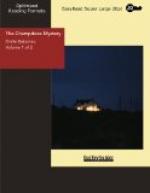“You silly little fool, was that all you said?”
“Not quite, for I said that I must see Mechenit. Then, looking at me very suspiciously, he said, ‘And who sent you here, you little spy?’”
The Counsellor started.
“Indeed! and what did you say in return?” asked he.
“Why, of course I said that you had sent me.”
“Yes, yes, that was right.”
“And then Jean rubbed his hand over his chin, and looking at me very curiously, said sternly,—
“’So you have come from the Counsellor, have you? Ah, I see it all, and so shall he one of these days.’”
At these words Daumon felt his knees give way under him; but all further questioning was stopped by the appearance of M. de Puymandour on his way to Champdoce. He therefore dismissed Francoise, and awaited the return of this gentleman, from whom he hoped to gain the fullest information regarding the Duke’s malady. The intelligence which he received calmed him a little, and repenting of his treatment of Diana, he went and hung about the gates of the Chateau de Laurebourg, until he was lucky enough to catch sight of the girl in the garden, for her anxiety would not permit her to remain in the house. He beckoned to her, and then said,—
“M. Norbert did not make the dose strong enough. The Duke is as strong as a horse; but it is all right, for should he live, he will be an idiot, and so our end is as much gained as if he had died.”
“But why does not Norbert write to me?” asked Diana seriously.
“Why, because he has some faint glimmerings of common sense. How do you know that he may not have half a dozen spies about him? You must wait.”
Diana and the Counsellor waited for a week, but Norbert made no sign. Diana suffered agonies, and the days seemed to pass with leaden feet. Sunday came at last. The Marchioness de Laurebourg had attended early Mass, and had given orders that her daughter should go to high Mass under the escort of her maid. Diana was highly pleased with this arrangement, for she hoped to have a chance of seeing Norbert, but she was disappointed. The Mass had commenced when she entered, but the spot occupied by the Duke and his son was vacant. She followed the service in a purely mechanical manner, and at last noticed that the priest had taken his place in the pulpit.
This was generally an exciting moment for the inhabitants of Bevron, for it was immediately before the sermon that the banns of marriage were published. The priest gazed blandly down upon the expectant crowd, coughed slightly, used his handkerchief, and finally took from his breviary a sheet of paper.
“I have,” said he, “to publish the banns of marriage between——” here he made a little pause, and all the congregation were on the tenterhooks of expectation; “between,” he continued, “Monsieur Louis Norbert, Marquis de Champdoce, a minor, and only legitimate son of Guillaume Caesar, Duke de Champdoce, and of his wife Isabella de Barnaville, now deceased, but who both formerly resided in this parish, and Desiree Anne Marie Palouzet, minor, and legitimate daughter of Rene Augustus Palouzet, Count de Puymandour, and of Zoe Staplet, his wife, but now deceased, also residents of this parish.”




